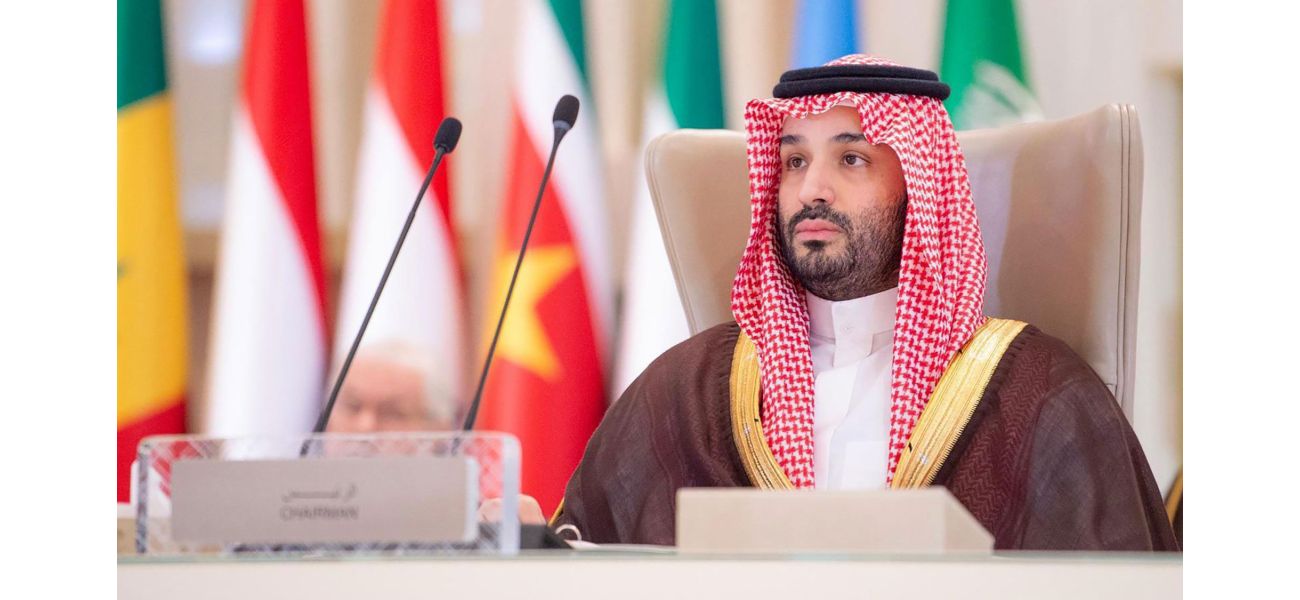Saudi Arabia leader accuses Israel of committing genocide in Gaza Strip.
Prince Mohammed bin Salman addressed a summit of Islamic leaders in Riyadh.
November 13th 2024.

The Crown Prince of Saudi Arabia, Mohammed bin Salman, has made a bold statement against Israel, accusing them of committing "collective genocide" in Gaza. This is the strongest criticism he has ever directed towards the country since the war began last year. Speaking at a gathering of leaders from Islamic nations in Riyadh on Monday, the de facto leader of Saudi Arabia reiterated the kingdom's condemnation and refusal of Israel's actions against the Palestinian people. The death toll in Gaza has reached a devastating 43,000 since Israel launched their attacks.
Just yesterday, there were reports of at least 30 more casualties in Gaza city and northern Gaza. Many more are still trapped under the rubble, according to Gaza's Civil Defence spokesperson, Mahmoud Basal. CNN has reached out to the Israeli military for a response. It's worth noting that Saudi Arabia was in the process of negotiating a historic normalization agreement with Israel, but they have since stated that this is no longer on the table unless Palestine is granted statehood. Israeli Prime Minister Benjamin Netanyahu has rejected this demand.
Interestingly, the Saudi crown prince, who is also known as MBS, has also come to the defense of Iran. This is quite a contrast to his previous comments in 2017, where he compared the Iranian Supreme Leader, Ayatollah Ali Khamenei, to Adolf Hitler. MBS called on the international community to compel Israel to respect Iran's sovereignty and refrain from attacking their territories. This is a significant shift in messaging from Saudi Arabia, who have gone from simply condemning Israel to publicly accusing them of genocide and advocating for more international protection for Iran.
The relationship between Saudi Arabia and Iran has been tense for decades, but they have recently made efforts to repair their ties. This comes at a time when regional conflicts show no signs of resolution, and the normalization process with Israel has stalled. To show unity among Islamic nations, Saudi Arabia hosted a high-level meeting on Monday, where leaders from various countries, including Palestinian President Mahmoud Abbas, Lebanese caretaker Prime Minister Najib Mikati, Jordan's King Abdullah II, and Egyptian President Abdel Fattah el-Sisi, were in attendance.
The goal of this meeting was to unify positions and exert pressure on the international community to take action and put an end to the ongoing attacks and establish lasting peace in the region, according to Saudi's governmental state agency. It's worth noting that some notable figures were also present, such as Turkey's President Recep Tayyip Erdogan and Syria's President Bashar al-Assad, who are currently embroiled in a conflict over Turkey's military operations and support for rebel groups in northern Syria.
Experts believe that MBS organized this meeting to showcase his strength in unifying Islamic nations before the upcoming US election and the inauguration of President-elect Donald Trump. Trump's stance on the Israel-Hamas war and his policies towards Iran remain uncertain. However, it is likely that he will seek to reinstate sanctions on Iran to isolate them diplomatically and weaken them economically, according to Brian Hook, who was Trump's Iran envoy during his first administration.
With Trump's potential national security adviser, Mike Waltz, and likely Secretary of State, Marco Rubio, both having hardline policies on Iran, MBS is aware of the potential risks of aligning with the US in a "maximum pressure" campaign against Iran. Instead, Saudi Arabia has been expanding its relationship with Iran, with MBS speaking with Iranian President Masoud Pezeshkian and welcoming their vice president in Riyadh. They have also sent their army chief of staff to Tehran for meetings with their Iranian counterpart.
According to Trita Parsi, the executive vice president of the Washington, DC-based Quincy Institute, Saudi Arabia is trying to avoid being involved in any potential war between the US, Israel, and Iran. This is largely due to domestic pressure from their own population and the effectiveness of Iranian ballistic missiles. Hussein Ibish, a senior resident scholar at the Arab Gulf States Institute in Washington, believes that the normalization of relations with Israel comes with several political risks for Saudi Arabia, including possible internal political dissent and a contested role as a regional Arab and global Islamic leader. Ibish suggests that Saudi Arabia is looking for more substantial incentives from the international community before committing to a deal with Israel.
Just yesterday, there were reports of at least 30 more casualties in Gaza city and northern Gaza. Many more are still trapped under the rubble, according to Gaza's Civil Defence spokesperson, Mahmoud Basal. CNN has reached out to the Israeli military for a response. It's worth noting that Saudi Arabia was in the process of negotiating a historic normalization agreement with Israel, but they have since stated that this is no longer on the table unless Palestine is granted statehood. Israeli Prime Minister Benjamin Netanyahu has rejected this demand.
Interestingly, the Saudi crown prince, who is also known as MBS, has also come to the defense of Iran. This is quite a contrast to his previous comments in 2017, where he compared the Iranian Supreme Leader, Ayatollah Ali Khamenei, to Adolf Hitler. MBS called on the international community to compel Israel to respect Iran's sovereignty and refrain from attacking their territories. This is a significant shift in messaging from Saudi Arabia, who have gone from simply condemning Israel to publicly accusing them of genocide and advocating for more international protection for Iran.
The relationship between Saudi Arabia and Iran has been tense for decades, but they have recently made efforts to repair their ties. This comes at a time when regional conflicts show no signs of resolution, and the normalization process with Israel has stalled. To show unity among Islamic nations, Saudi Arabia hosted a high-level meeting on Monday, where leaders from various countries, including Palestinian President Mahmoud Abbas, Lebanese caretaker Prime Minister Najib Mikati, Jordan's King Abdullah II, and Egyptian President Abdel Fattah el-Sisi, were in attendance.
The goal of this meeting was to unify positions and exert pressure on the international community to take action and put an end to the ongoing attacks and establish lasting peace in the region, according to Saudi's governmental state agency. It's worth noting that some notable figures were also present, such as Turkey's President Recep Tayyip Erdogan and Syria's President Bashar al-Assad, who are currently embroiled in a conflict over Turkey's military operations and support for rebel groups in northern Syria.
Experts believe that MBS organized this meeting to showcase his strength in unifying Islamic nations before the upcoming US election and the inauguration of President-elect Donald Trump. Trump's stance on the Israel-Hamas war and his policies towards Iran remain uncertain. However, it is likely that he will seek to reinstate sanctions on Iran to isolate them diplomatically and weaken them economically, according to Brian Hook, who was Trump's Iran envoy during his first administration.
With Trump's potential national security adviser, Mike Waltz, and likely Secretary of State, Marco Rubio, both having hardline policies on Iran, MBS is aware of the potential risks of aligning with the US in a "maximum pressure" campaign against Iran. Instead, Saudi Arabia has been expanding its relationship with Iran, with MBS speaking with Iranian President Masoud Pezeshkian and welcoming their vice president in Riyadh. They have also sent their army chief of staff to Tehran for meetings with their Iranian counterpart.
According to Trita Parsi, the executive vice president of the Washington, DC-based Quincy Institute, Saudi Arabia is trying to avoid being involved in any potential war between the US, Israel, and Iran. This is largely due to domestic pressure from their own population and the effectiveness of Iranian ballistic missiles. Hussein Ibish, a senior resident scholar at the Arab Gulf States Institute in Washington, believes that the normalization of relations with Israel comes with several political risks for Saudi Arabia, including possible internal political dissent and a contested role as a regional Arab and global Islamic leader. Ibish suggests that Saudi Arabia is looking for more substantial incentives from the international community before committing to a deal with Israel.
[This article has been trending online recently and has been generated with AI. Your feed is customized.]
[Generative AI is experimental.]
0
0
Submit Comment





